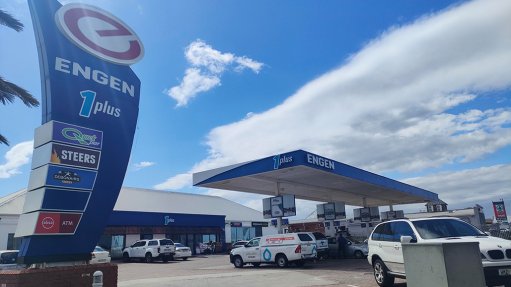Navigating the Transition from Employment to Entrepreneurship: Insights from a black female Project Manager's Journey
This article has been supplied by the author and has not been written or solicited by Creamer Media. It may be available only for a limited time on this website.
By Mbali Milanzi, Commercial Director at Tshepa Basadi (pty) ltd
I graduated from the University of the Witwatersrand as a chemical engineering graduate and was introduced to mining by a global mining organization that funded my studies. I worked in the Kalahari basin as a process engineering graduate and within the first few months as a graduate in training, I was drawn to the world of projects. I was determined to make a career out of this fascinating world, from studying for a master's in project management with the University of Pretoria to obtaining my project management professional accreditation with the project management institute.
My life as a project manager in the mining industry
I spent my time in the mining industry, learning project management under great mentors, in an organization with world-class project management processes and systems. I implemented small to large stay-in-business projects. During this time, I honed many skills that would be crucial in my journey towards entrepreneurship. I honed vital skills in stakeholder engagement, negotiation, and advocating for ideas. These competencies, crucial for corporate success, became the cornerstone of my entrepreneurial endeavors. Selling myself and my vision to internal clients equipped me with the foundation to build a successful business.
One significant facet of this world of projects that ties into the world of entrepreneurship is procurement. The supply chain department is the entry point into most industries and the mining industry is no different. The supply chain department is the make-or-break point for the entrepreneur, for a few reasons:
Supply chain processes are by design risk averse to drive the organizations compliance objectives while protecting the organization against potentially inapt suppliers. While quite fitting, these processes tend to be exclusionary, making the industry almost impenetrable for new or unfamiliar entrants. A remedy commonly used is to have a segregated pool of enterprises, which you upscale to the required compliance level through enterprise development initiatives. While these efforts can be effective in building robust enterprises, some of these enterprises are not guaranteed business with the organization running the enterprise development program. Which may inevitably lead to the failure of said enterprise.
Within the project management landscape, my encounters with suppliers highlighted a stark reality—women-owned enterprises were rare finds, akin to unicorns in a forest. Efforts to integrate them into the supply chain were made, but stringent requirements within rigorous industries, such as mining, posed challenges for these entities. Similarly, endeavours to bring black-owned entities on board faced hurdles despite some successes. Often, these entities struggled due to prejudice, lack of financing, lack of business acumen, underquoting, cash flow constraints, and a lack of technical expertise, resulting in compromised project quality. Witnessing the trials faced by these entrepreneurs, I recognized the critical role of formal business training and the significance of adequate technical and financial support. Those with these foundations demonstrated a notably higher chance of success, showcasing resilience and dedication despite adversities.
The supply chain selection processes should be designed to make the selection unbiased. However, where there's human intervention required, bias is inevitable, and the numbers conform to such bias. Therefore, adjudication safeguards fail at the hands of human beings. As a project manager, your intention and role is to safeguard the success of your project and very often the suppliers/service providers are a crucial component of this. So, your instincts push you to choose the supplier who may seem like the safest option, and those choices usually resemble well-known brands. Understandably, too much effort would be required to induct a new person into the mine. So, our selection criteria will ensure that we hire familiar faces; this criterion will measure experience on the mine, whether the supplier is already a vendor and has a compliant safety, operational footprint, safety records, organizational experience, key staff, track record, and bonds. However, this criterion makes it almost impossible for new entrants to compete in the mining industry. Applying these criteria in isolation without concerted efforts to bring in new entrants is often a recipe for the same old results, with no prospects of meaningful change.
Fast forward to my bold move into the world of entrepreneurship.
Transitioning from the structured environment of employment to the unpredictable yet promising realm of entrepreneurship is a leap that demands both courage and resilience. My journey, evolving from a project manager within corporate structures to an entrepreneurial venture, has been a tapestry woven with challenges, lessons, and undeniably, opportunities.
Upon stepping into entrepreneurship, our success was intertwined with lessons learned from the experiences with suppliers on our projects. We consciously selected an industry we comprehended well, offering services within our expertise and maintaining clarity. However, similar to the aforementioned suppliers we lacked formal business training, which was sometimes a hurdle, leading us to learn through trial and error.
However, breaking into the mining industry proved to be an arduous task with prolonged turnaround times. Trust-building was a gradual process, compounded by prejudices that affected our initial reception.
Being a black female-owned entity has its own set of challenges. While appealing for addressing transformation objectives, it often becomes a subject of scrutiny rather than an opportunity for true partnership. As the business has grown and expansion beyond our current footprint becomes the only means to survival, questions about locality and turnover size disproportionately become criteria for eligibility thus creating additional barriers to entry.
Surprisingly, growth, which should ideally symbolize success, becomes a double-edged sword. It inadvertently erects new barriers, limiting opportunities as organizations start pigeonholing us solely based on our DTI categorization as Generic rather than assessing us based on our capabilities and offerings.
Fortunately, as we prove our worth, our clients gradually perceive us not merely as a scorecard fulfilment but as genuine partners capable of delivering lasting value.
Nevertheless, we’ve used our organisations growth as a tool to effect change. Growth has enabled us to invest in all our people, support other women, and contribute positively to our communities. Yet, the uphill battle persists in breaking through biases and prejudices ingrained in the system.
Despite these challenges, our resilience has led us to create opportunities and carve a niche in an industry that may have initially seemed impenetrable. We persist not just for ourselves but for the hopeful young minds we inspire and the legacy for change.
Optimistic about the future
In conclusion, the journey from employment to entrepreneurship, especially from a black female project manager's lens, is a path laden with obstacles and opportunities. It's a clarion call for organizations to reassess the authenticity and mechanisms of their empowerment efforts, but beyond this to view black women-owned businesses not as checkboxes but as allies in shaping a more inclusive and promising future. The battle for transformation and gender parity is ongoing, and collective efforts are imperative for its triumph.
Comments
Press Office
Announcements
What's On
Subscribe to improve your user experience...
Option 1 (equivalent of R125 a month):
Receive a weekly copy of Creamer Media's Engineering News & Mining Weekly magazine
(print copy for those in South Africa and e-magazine for those outside of South Africa)
Receive daily email newsletters
Access to full search results
Access archive of magazine back copies
Access to Projects in Progress
Access to ONE Research Report of your choice in PDF format
Option 2 (equivalent of R375 a month):
All benefits from Option 1
PLUS
Access to Creamer Media's Research Channel Africa for ALL Research Reports, in PDF format, on various industrial and mining sectors
including Electricity; Water; Energy Transition; Hydrogen; Roads, Rail and Ports; Coal; Gold; Platinum; Battery Metals; etc.
Already a subscriber?
Forgotten your password?
Receive weekly copy of Creamer Media's Engineering News & Mining Weekly magazine (print copy for those in South Africa and e-magazine for those outside of South Africa)
➕
Recieve daily email newsletters
➕
Access to full search results
➕
Access archive of magazine back copies
➕
Access to Projects in Progress
➕
Access to ONE Research Report of your choice in PDF format
RESEARCH CHANNEL AFRICA
R4500 (equivalent of R375 a month)
SUBSCRIBEAll benefits from Option 1
➕
Access to Creamer Media's Research Channel Africa for ALL Research Reports on various industrial and mining sectors, in PDF format, including on:
Electricity
➕
Water
➕
Energy Transition
➕
Hydrogen
➕
Roads, Rail and Ports
➕
Coal
➕
Gold
➕
Platinum
➕
Battery Metals
➕
etc.
Receive all benefits from Option 1 or Option 2 delivered to numerous people at your company
➕
Multiple User names and Passwords for simultaneous log-ins
➕
Intranet integration access to all in your organisation





















